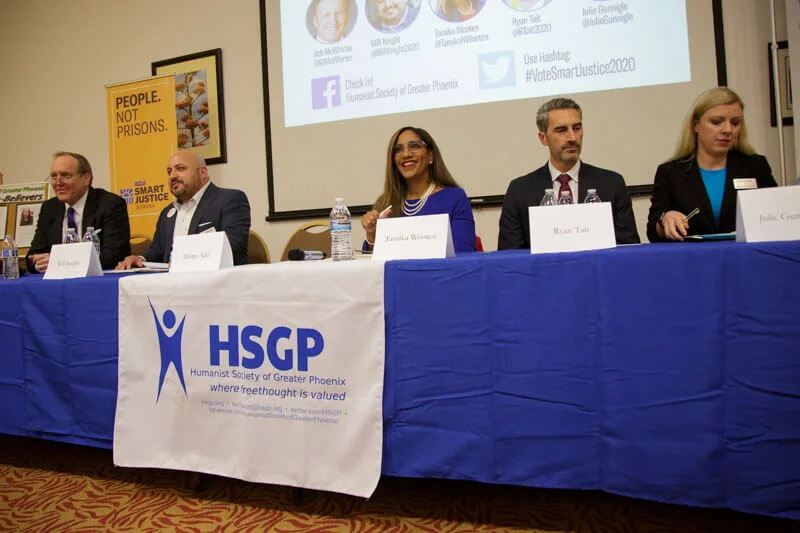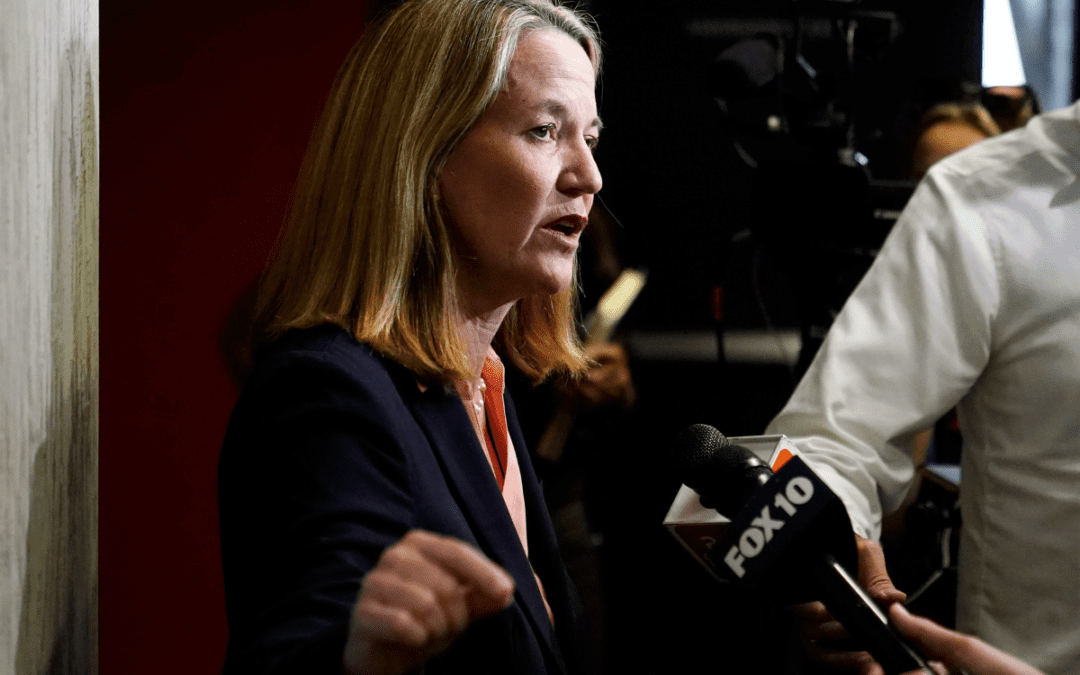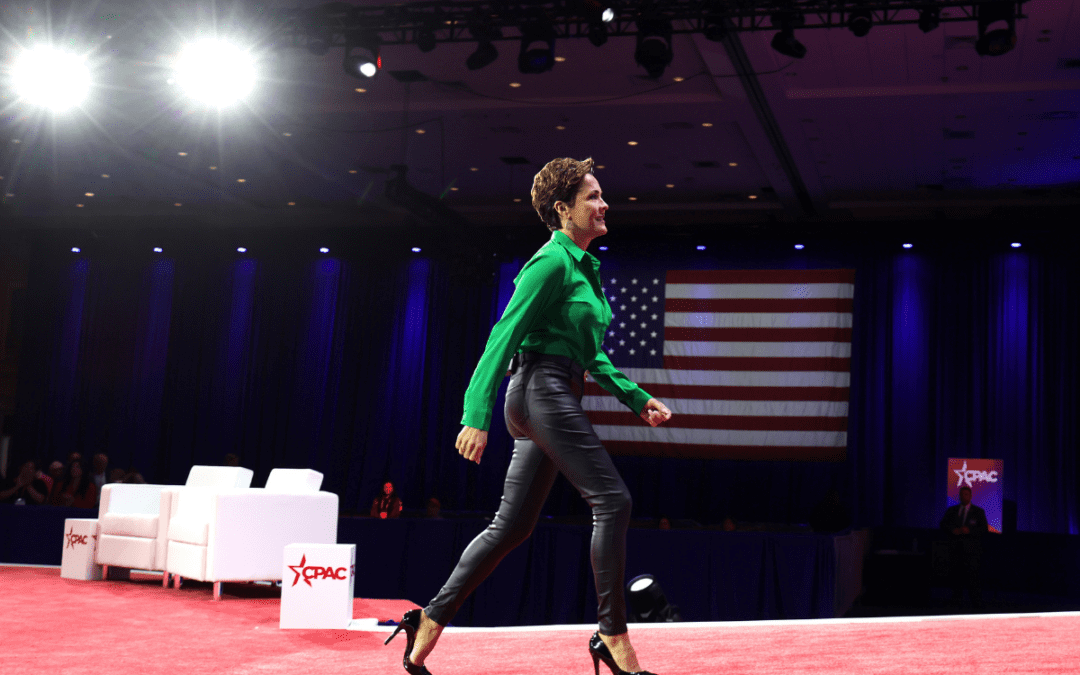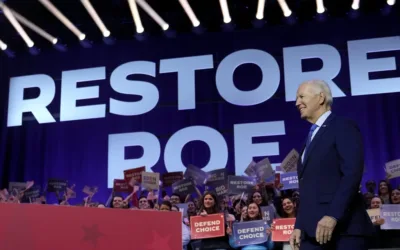
Candidates discussed how they would bring about criminal justice reform as the County’s top prosecutor.
A rapt audience filled the Humanist Society of Greater Phoenix’s meeting hall in Mesa Thursday to hear how candidates for Maricopa County Attorney’s plans for criminal justice reform.
A crowd of lawyers, activists, and community members listened to candidates talk about freedom of religion, reducing the prison population, and police accountability.
All five candidates in attendance provided their vision for how they’d make reforms to an office long-held by attorney Bill Montgomery. Montgomery left his post in September 2019 when he was appointed to the Arizona State Supreme Court by Gov. Doug Ducey.
The position was filled in October by fellow Republican County Attorney candidate Allister Adel. Adel declined an invitation from the Humanist Society and the ACLU of Arizona to participate in the town hall.
The five Democratic candidates challenging Adel seemed to broadly agree on important criminal justice reform issues, but each differed slightly when it came to their approach.
The Elephant Not In the Room
Montgomery’s tenure was a source of controversy for the five Democratic candidates looking to unseat his appointed replacement. They cited his opposition to adoptions by LGBTQ couples and his use of $70,000 in taxpayer funds for an anti-Muslim training seminar, according to reporting by the Phoenix New Times.
Montgomery’s move to the highest court in the state was also rife with controversy. He first applied for the position in March 2019, but was turned down by the state’s Commission on Appellate Court Appointments. Ducey then made moves to change the selection process for judges in May, paving the path for Montgomery’s appointment when another spot opened on the bench four months later.
Montgomery is currently facing an ethics complaint for allegedly covering up misconduct by prosecutor Juan Martinez. Martinez is best known for prosecuting convicted murderer Jodi Arias.
In November 2019, Adel announced she would release Martinez’s misconduct records through the office’s public records request process. However, the records have not yet been released.
Freedom of Choice
The first question of the night was about protecting the separation of church and state. The candidates talked about ways they would protect religious minorities, abortion rights, LGBTQ marriage, and adoption.
“I will never allow this office to impose religion on someone else’s uterus,” said Julie Gunnigle, a Scottsdale-based business litigator and former assistant state attorney in Cook County, Illinois. She committed to not prosecuting women or abortion providers in the event the U.S. Supreme Court overturns Roe vs. Wade. This would put her at odds with both federal and state law, as Arizona still bans abortion and restricts access to birth control.
Will Knight, a former public defender and adjunct professor at ASU, pointed to his record fighting for marriage equality and criticized Montgomery for blocking a second-parent adoption by a lesbian couple.
“That was my friend he did that to,” Knight said, adding that he would not use his office to “prosecute animus.” He also criticized Montgomery for making a plea deal with two women who vandalized a mosque in Tempe.
The candidates were also asked about how the term “religious freedom” has been used to defend not providing services to the LGBTQ community.
“If somebody’s discriminating against somebody, that’s discrimination,” said Criminal Defense Attorney Bob McWhirter. He added that religious freedom isn’t an excuse for discrimination. “If you don’t get that, you’re not American.”
Reducing the Prison Population
McWhirter started his introduction with a focus on mass incarceration. He said a good county attorney must focus on keeping the community safe, but that mass incarceration does not achieve that goal.
“There are people, yes, who need to go to prison, but there are scores of more people who we can do much more for,” McWhirter said. He explained that focusing on underlying problems such as joblessness and drug addiction would be more effective at lowering crime and recidivism than simply locking people up.
Tamika Wooten, the former lead prosecutor in Glendale, Arizona, added that a large part of Arizona’s prisoners are non-violent offenders. Her solution to crowded prisons would be to treat mental illness and addiction as health emergencies as opposed to crimes. She spoke of her success implementing diversion programs as prosecutor.
Ryan Tait, a former prosecutor turned criminal defense attorney, echoed Wooten in opting for treatment programs over prison sentences, adding, “that’s what works.” He said the last five decades of policy around drug addiction have not achieved the goal of reducing crime and rehabilitating addicts.
Gunnigle stated she would stop prosecuting marijuana possession, but she’d be tough on crime – in a smart and fair way.
Knight attributed mass incarceration to a “tough on crime culture.” He said he plans to focus on a “harm-based” mode of thinking that takes into consideration community displacement caused by harsh prosecutions.
During this discussion, audience member Hayden Beaulieu told the panel he was tried as an adult at 15 and felt obligated to take a plea for fear of trial. He asked the candidates how they would have approached his case.

Knight said he wouldn’t coerce guilty pleas as a prosecutor, saying coercion leads to wrongful convictions. McWhirter agreed and promised to expunge Beaulieu’s record when he’s elected as county attorney.
Police Accountability
The questions then turned to police accountability – a topic of national and local importance.
Phoenix drew national attention in 2018 for a record number of police shootings. The city also faced criticism when City Manager Ed Zuercher seemed to blame the public for the increase.
Sitting feet away from a poster of Antonio Arce, a 14-year-old with an airsoft gun shot and killed by a Tempe police officer in January 2019, all the candidates agreed they would use their office to hold officers accountable.
“When law enforcement violence goes unanswered, our community relationships are fractured,” Knight said. He added that what he sees as a culture of mistrust between residents and law enforcement ultimately makes everyone less safe.

Wooten talked about creating a task force made up of prosecutors, seasoned law enforcement, and community members to review cases of police misconduct. She said community buy-in is the only way to restore trust and keep the community safe.
The candidates were also asked whether they would review cases of officers put on the county’s “Brady List.” This is a list of police officers with a history of giving false or misleading testimony. All the candidates committed to having a more transparent Brady List. Wooten said it was key for holding police accountable.
“If an officer has a Brady violation, that information needs to be shared with a jury,” she said.
Knight also said it’s key to rebuild that trust between law enforcement and the community.
“No one is above the law,” he noted.
On August 4th, Maricopa County voters will choose which of these candidates will challenge Adel. Voters have until July 6th to mail their registration to the Maricopa County Recorder, or they can register online with the MVD.

BREAKING: AG Kris Mayes sues rental corporations for conspiratorial price-fixing
It looks like, legally speaking, rent really may be “too damn high.” Arizona Attorney General Kris Mayes announced Wednesday a lawsuit against nine...

Op-ed: Trump’s journey from hosting The Apprentice to being the biggest loser
Leading up to the 2016 election, Donald Trump crafted an image of himself as a successful businessman and a winner. But in reality, Trump has a long...

Kari Lake’s plan for the US Senate: ‘The end of democracy’
The world’s most far-right political leaders flocked to National Harbor, Maryland, last week for a conservative conference where attendants idolized...

Flight attendants picket at more than 30 airports in ‘unprecedented’ show of solidarity
Hundreds of flight attendants picketed at Phoenix Sky Harbor Airport last week, calling attention to stagnant wages with low purchasing power, poor...




